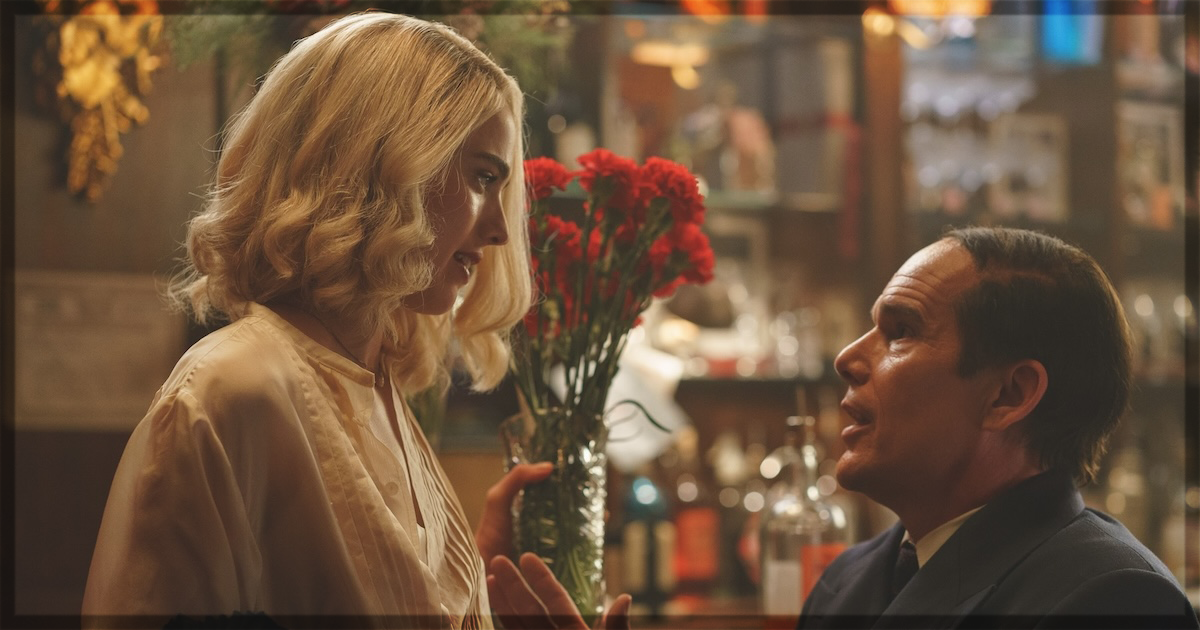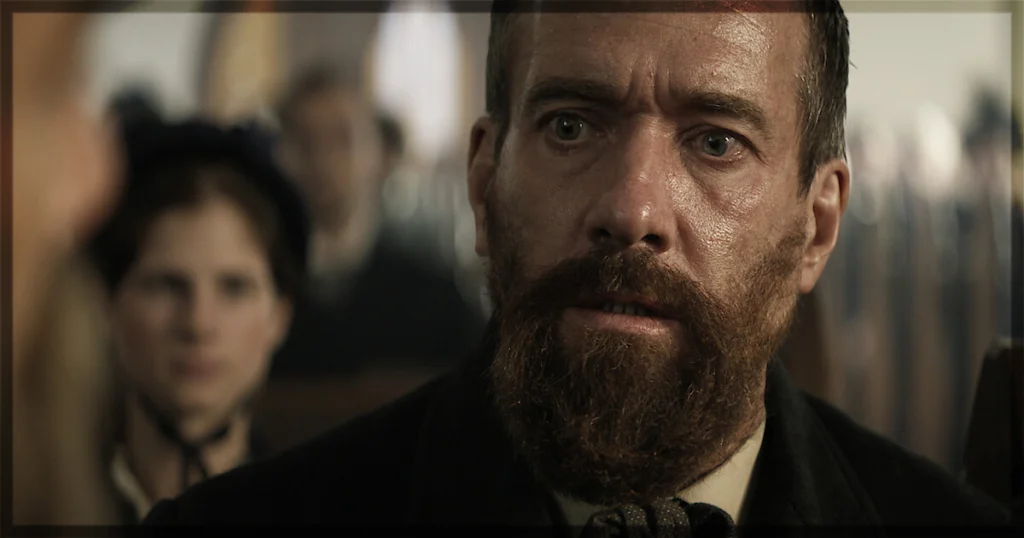This could have been a play and may well get a second life as a play, because its single set, very talky script and clever staging keep us in the room for the 100-minute runtime. It is heavily inspired by real events but also plays fast and loose as required in order to keep raising the stakes. And at its centre is an extraordinary performance by Ethan Hawke as Lorenz Hart, the composer who personally wrote a huge part of the classic American songbook before his lonely death at the age of 48. It’s a story of mistakes, failure, artistic compromise and the lies we tell ourselves in order to be happy, and if this is your sort of thing you’ll thrill to every minute.
Now. Mr. Hart was not a tall man and some clever special effects have been used to make Mr. Hawke look and seem small as he installs himself at the bar of Sardi’s, the Manhattan restaurant where Broadway shows traditionally repair after opening night to await their reviews (though the movie was filmed in Dublin). It is March 1943 on the opening night of the musical Oklahoma! on which Hart was not involved. No, that work was created by his creative partner Richard Rodgers (Andrew Scott) and another lyricist, Oscar Hammerstein (Simon Delaney). Hart is there to show his face at the party so as not to lose face, making the politic career decision to wish the new show well even though it’s too cornball and sappy for him. The fact there’s a war on and people might be in the mood for some uncomplicated cheer is dismissed with a wave. Instead Hart convinces Eddie the bartender (Bobby Cannavale, who it is always a pleasure to see) to sneak him drinks as he regales him and the quiet man in the corner, who turns out to be author E. B. White (Patrick Kennedy), with his opinions on all and sundry. But Hart’s main focus of attention is Elizabeth (Margaret Qualley), a well-connected and beautiful young woman who has been expertly stringing Hart along to further her own career. Hart knows he’s being used but this is going to be the night when he finally, finally seduces her at last. His plans are all in place, the stage is set. He just needs every little thing to go right.
So this is a movie in which we get to watch Mr. Hawke talk, and talk and talk, and use every trick in three little books to expertly hold our attention. Those are the books of the raconteur – an amusing story for every occasion from someone who must sing for his supper – the closeted homosexual – gain entry into mainstream society with such devastating wisdom and insight that it overrides any personal distaste – and the fool. And Hart is indeed a fool, desperate to believe that the 20-year-old Elizabeth is in love with him, desperate to think the delivery boy might attend the party he says he is throwing, desperate for Eddie to accept that he’s not drinking too much, and desperate to prove to the whole world that his career and his working relationship with Rodgers isn’t threatened by this new one with Hammerstein.
The great thing about Blue Moon is that its sympathies are entirely with Hart. Rodgers makes it completely clear how much he likes and respects Hart and how delighted he would be to continue working with him, with the sole condition that Hart get his drinking under control. Even Eddie the bartender, who has heard it all ten times and seen it all twice, likes Hart and is very happy to let him talk. It’s clear to all of them, even the serviceman on leave who’s playing the piano (Jonah Lees) that to puncture any of Hart’s delusions would be unforgiveable. So what we are watching is here is someone’s last, desperate stand against all the assorted demons that have made his life miserable. All his talent, all his insight into human nature and all his hopes might, just might, be able to be fought off just a little longer especially if he gets a little help. The trouble is that people in a lifeboat know better than to get back into the sea to save a drowning man. The drowning man has to work to be saved. Make it easy to be saved, in fact. And it’s clear that the Hart’s old friends are tired of trying, so the question is whether someone new will be charmed enough in time to throw the rope.
Richard Linklater, cinema’s greatest expert on the passing of time, probably chose this script because of how intensely it condenses many of life’s dilemmas. He certainly knows how to maximise Shane F. Kelly’s cinematography and Sandra Adair’s editing in order to make its world feel spacious, as if there’s room for every human feeling to walk through those restaurant doors. In addition to E. B. White, there are Easter-egg-style cameos for Weegee (John Doran) and a boy who would grow up to be Stephen Sondheim (Cillian Sullivan). But most of all there is the terrible question most of us will have to ask ourselves eventually: is it our fault we haven’t got what we wanted?
But even with such an expert at the help, this is very much an actor’s movie, with Ms. Qualley demonstrating her verbal gifts are more important than her body, Mr. Scott perfectly weaponizing his talents for dissatisfaction and impatience, and Mr. Cannavale anchoring the whole film with his relaxed knowingness. But it’s Mr. Hawke’s triumph, and a triumph it is. After an early beginning as a surprisingly non-generic prettyboy, Mr. Hawke has spent the last decade as weary men facing down catastrophe. He’s chosen to weaponise his looks and his quicksilver intelligence by developing a fascinating career playing people on the edge. Whether it’s an edge they have created (as in the unusual amount of horror movies in which he plays the villain) or one they are facing through accident, Mr. Hawke has become one of the best actors we have at walking through a crisis.
Here his longstanding professional relationship with Mr. Linklater clearly enabled them both to go deeper than they normally do. Mr. Linklater and screenwriter Robert Kaplow also collaborated together before on 2008’s Me and Orson Welles, and we must never forget how quietly and solidly Mr. Linklater has focused his own career on men’s relationships with themselves. Even though his movies are so brilliantly made, because his movies are so talky we can forget how thoughtful and focused a director he is. Blue Moon is a movie that will stand up to multiple repeat viewings in order to catch every nuance, and it demonstrates how fortunate we are that it’s so much easier now for people to be accepted for who they truly are. It’s to be hoped that LGBTQ+ audiences under thirty especially will watch this in appreciation of the battles fought on their behalf by people who knew they would never enjoy the freedoms today’s queers take for granted. But anyone who has ever stared into a bottom of a glass and wondered why things haven’t worked out will find something here to love.
Blue Moon recently played at the London Film Festival.
Learn more about the film at the IMDB site for the title.


